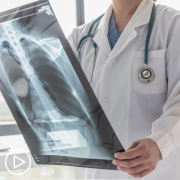How Can Lung Cancer Patients Take a More Active Role in Their Care?
How Can Lung Cancer Patients Take a More Active Role in Their Care? from Patient Empowerment Network on Vimeo.
As a lung cancer patient, how can someone take a more active role in their care? Experts Dr. Nicole Rochester and Dr. Olugbenga Okusanya provide advice for patients to empower themselves and questions to ask themselves about their lung cancer care team members for their best care.
See More from Best Lung Cancer Care No Matter Where You Live
Related Resource:

|

|

|
Transcript:
Dr. Nicole Rochester:
What advice do you give to patients that you see so that they can feel empowered, Dr. Okusanya? Is there any specific advice that you give when you see patients and things that just helped them to take this active role that you’ve been describing?
Dr. Olugbenga Okusanya:
Number one, I tell patients to bring someone with them to their appointments, someone who can stand by as within reason someone who can be there to listen as well, because usually I say, if I tell you 100 things in an appointment which can legitimately have, I could give you 100 unique points of information and in one 45-minute visit. If you catch 30 of them or 35 of them, you really understand that. I think that’s a lot because they’re very emotionally charged. So, hopefully someone else is with you, maybe catches another 30 or 40, and that gets you to a point where you can really sit down later and understand. I encourage patients to take notes to write things down, and if they want to, to record, to have audio recording of the session, I wouldn’t say anything to you now that I wouldn’t say in a month or in a year, or anywhere else. I’m going to tell you exactly what I think and I…and if I have uncertainty, I will expose that uncertainty, I will let you know that this is a case that could go either way. And this is a piece of information that I’m looking back and forward between these two options and that really helps the patients later on go back and say, “Did I really hear that right? Did I really understand it right?” So that you can feel like you’re getting the best care, and I really think that you have to make sure that you feel comfortable with the provider.
I think that’s just the number one thing. Are you happy with them? Do you like the way they comported themselves? Did you like the way they spoke to you? Did you like their staff? Also remember, you’re likely going to be interacting with their staff as much as you interact with the physician, so the other people in the office, the front desk people, the nurse practitioners, the medical assistants, those are the people that you’re going to spend a lot of time talking to. Did you have a good rapport with them? Also, all that stuff counts to make sure that you’re getting the best experience possible and that you can really be an advocate for yourself.
Dr. Nicole Rochester:
I just want to reiterate, you share so many pearls today, but I just want to reiterate a few of them, and they really resonate with me as a former caregiver and as a health advocate, but that’s the importance of asking questions, the importance of bringing a buddy, and I appreciate that, particularly in your field, when we go into a doctor’s office and the word “cancer” is stated, everything else goes out of the window, and even in less threatening situations, there’s data that shows that…I think about 20 percent to 25 percent of what we say as physicians is actually retained, so certainly when you get a bad diagnosis, that number is even lower, so bringing somebody with you who is not necessarily emotionally detached, but they can literally kind of be the note taker, and they may even pick up on some nuances and things that you may have missed as a patient is so incredibly important. I love that you’ve offered the option of recording, I think that’s also another tool that many patients and family members aren’t aware of, and I think there’s an assumption, and it’s true to some degree that doctors don’t want to be recorded, but knowing that that is an option.
The fact that the care that we receive really is impacted by whether or not the person specializes in lung cancer, a thoracic surgeon, and being empowered to ask that question, “Is this your specialty? How often do you see patients like me?” And being empowered to ask those questions that ultimately won’t lead to improved care is just so incredibly important, and I think just everything that you’ve shared that really allows the patients and the caregivers to understand just how important their role is you’re the one that’s going to take out the cancer and you’re the one that’s going to get them better, but there are so many things that happen before that step, before they are on that operating room table that is so important
Dr. Olugbenga Okusanya:
I think for patients and their advocates, I think it’s really important number that you’re putting together a health care team. You’re putting together a group of people like the avengers. You’re putting together a bunch of people to come together to help you deal with this health problem. You are entering into a therapeutic relationship, so that relationship has to be healthy in order for you to have the best possible outcome, you should feel good about, you know, your doctor is going to be very skilled, become very knowledgeable, and just like we talked about before. You really want to find someone who has the heart of a teacher, someone who can sit down and explain it to you in a way that’s going to be digestible and that is going to be actionable. So, I think if patients and advocates remember that you want to build a really solid, a really healthy relationship with someone who’s going to help you take care of your health, I think if you do that, you’re going to be in excellent hands.



